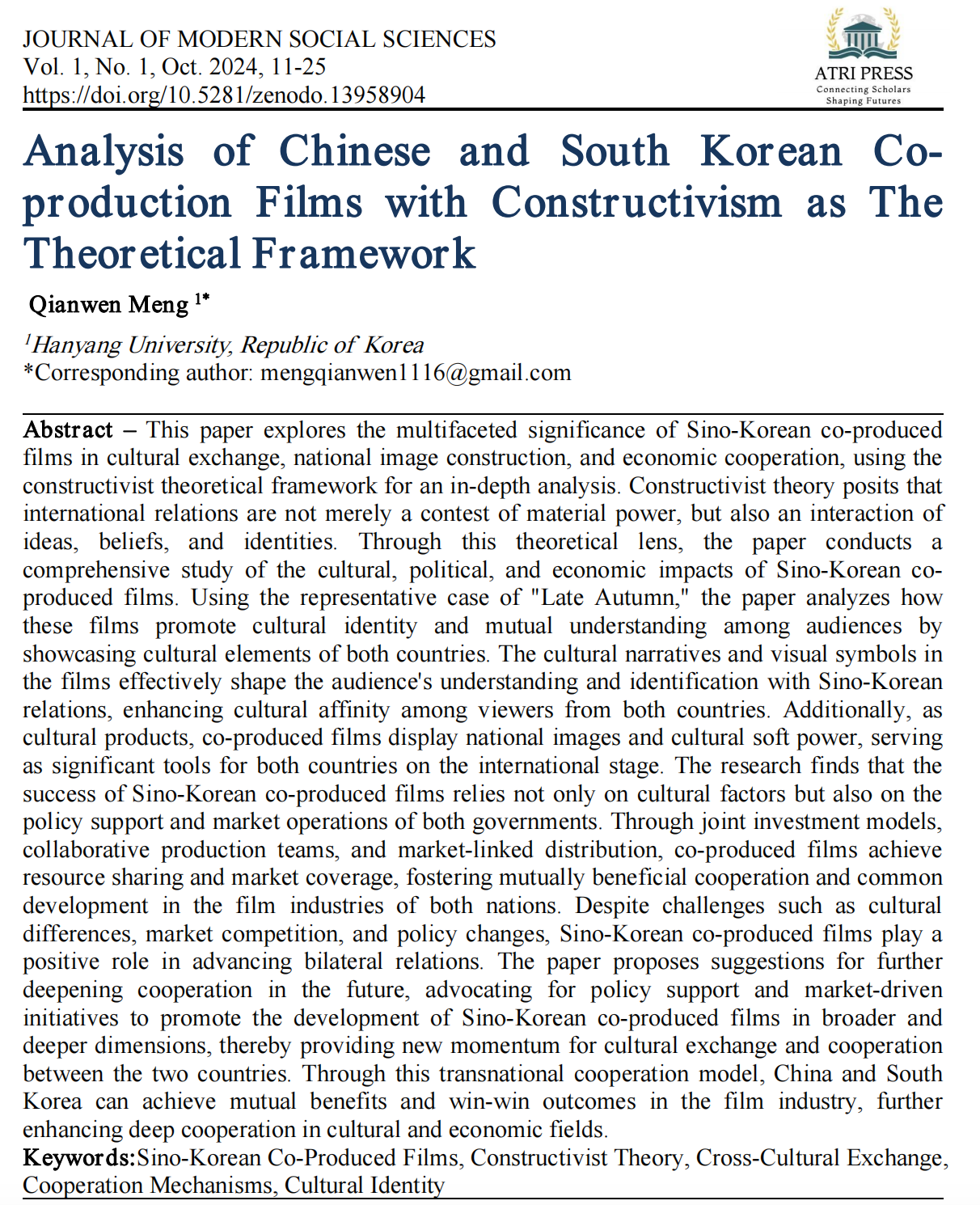Analysis of Chinese and South Korean Co-production Films with Constructivism as The Theoretical Framework
DOI:
https://doi.org/10.5281/zenodo.13958904Keywords:
Sino-Korean co-produced films, constructivist theory, cross-cultural exchange, cooperation mechanisms, cultural identityAbstract
This paper explores the multifaceted significance of Sino-Korean co-produced films in cultural exchange, national image construction, and economic cooperation, using the constructivist theoretical framework for an in-depth analysis. Constructivist theory posits that international relations are not merely a contest of material power, but also an interaction of ideas, beliefs, and identities. Through this theoretical lens, the paper conducts a comprehensive study of the cultural, political, and economic impacts of Sino-Korean co-produced films. Using the representative case of "Late Autumn," the paper analyzes how these films promote cultural identity and mutual understanding among audiences by showcasing cultural elements of both countries. The cultural narratives and visual symbols in the films effectively shape the audience's understanding and identification with Sino-Korean relations, enhancing cultural affinity among viewers from both countries. Additionally, as cultural products, co-produced films display national images and cultural soft power, serving as significant tools for both countries on the international stage. The research finds that the success of Sino-Korean co-produced films relies not only on cultural factors but also on the policy support and market operations of both governments. Through joint investment models, collaborative production teams, and market-linked distribution, co-produced films achieve resource sharing and market coverage, fostering mutually beneficial cooperation and common development in the film industries of both nations. Despite challenges such as cultural differences, market competition, and policy changes, Sino-Korean co-produced films play a positive role in advancing bilateral relations. The paper proposes suggestions for further deepening cooperation in the future, advocating for policy support and market-driven initiatives to promote the development of Sino-Korean co-produced films in broader and deeper dimensions, thereby providing new momentum for cultural exchange and cooperation between the two countries. Through this transnational cooperation model, China and South Korea can achieve mutual benefits and win-win outcomes in the film industry, further enhancing deep cooperation in cultural and economic fields.
References
[1] Choi, Y., "Collaborative Production Models in the Sino-Korean Film Industry," Journal of Contemporary Film Studies, Vol. 7, No. 3 (2019), pp. 132-148.
[2] Han, J., "Economic Cooperation and Market Mechanisms in Sino-Korean Film Co-productions," Journal of East Asian Economic Studies, Vol. 11, No. 1 (2019), pp. 90-110.
[3] Kim, J., "Analysis of Cultural Symbols and Identity in Co-produced Films: A Case Study of 'Late Autumn'," Journal of Korean Cinema Studies, Vol. 15, No. 2 (2020), pp. 23-45.
[4] Chen, Y., "The Industrial Mechanisms of Sino-Korean Co-productions: Policy Support and Market Demand," Asian Cinema Journal, Vol. 10, No. 3 (2018), pp. 102-119.
[5] Park, S., "Narrative Structures and Symbolism in Korean-Chinese Co-produced Films," Film Theory and Criticism, Vol. 12, No. 1 (2019), pp. 67-89.
[6] Xu, J., "The Role of Visual Symbols in Building Cultural Identity in Co-produced Films," Visual Communication Journal, Vol. 8, No. 2 (2020), pp. 49-70.
[7] Zhao, X., "Cross-cultural Exchange and Identity Construction in Sino-Korean Co-produced Films," International Journal of Cultural Studies, Vol. 13, No. 2 (2021), pp. 88-105.
[8] Kim, S., "Symbolism and Cultural Narratives in 'Late Autumn': A Korean Perspective," Asian Film Review, Vol. 6, No. 4 (2018), pp. 33-50.
[9] Lee, D., "Audience Interaction and Social Perception in Sino-Korean Co-productions: A Case Study of Social Media Reactions," Media and Communication Studies, Vol. 9, No. 4 (2017), pp. 55-78.
[10] Li, M., "Policy Impacts on the Success of Sino-Korean Co-produced Films," Government and Policy Review, Vol. 15, No. 1 (2020), pp. 77-95.

Downloads
Published
How to Cite
Issue
Section
License
Copyright (c) 2024 The author retains copyright and grants the journal the right of first publication.

This work is licensed under a Creative Commons Attribution 4.0 International License.


























